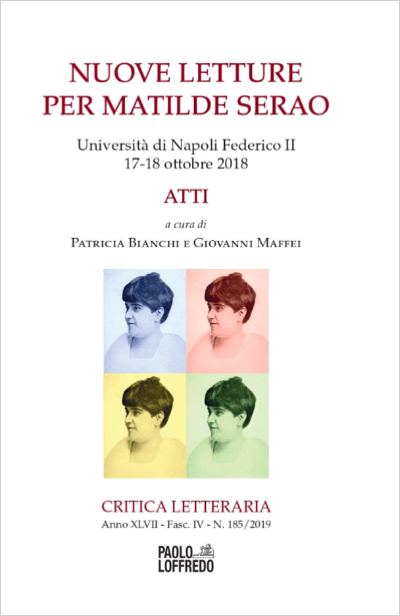Nuove letture per Matilde Serao - Atti
ISSN :
Language: Italian
Publisher: Paolo Loffredo Editore Srl

Description
Nuove letture per Matilde Serao - Atti
This volume deals, using unconventional approaches, with the litereal al linguistic complexity in Matilde Serao’s works. During the years, many Literature and Italin language history scholars, from Italy and France, have focused on her works, such as journalism and culture experts, focusing on the gender question. These “Nuove letture” show how Serao’s works can still be surprising: many aspects emerged and are still being inquired. Focusing on the interdisciplinary variety of contributions, new analitical perspectives emerged and new thematic cores and stilistical featuresare being investigated. The writer has been addressed as an extremely modern one at her time, even being confronted to many authors from that century. The works are divided into four sections. In La poligrafa Matilde Serao is represented through her correspondence with her daughter, focusing on her works about figurative arts and on her interest in cinema. At the end of this section there is a linguistic reading of her column Mosconi for “Corriere di Napoli”. In Vie: Napoli e l’Europa the authors retrace the physical places from Naples that the writer described, telling painful stories, full of epochal symptoms, about a young girl and a nun. The other contributions question the relationship between the creative routes of Serao and those of other authors, in Europe and Naples: Balzac and Flaubert who, having come before her, could be her models; Rea and La Capria who, later came, could not help but come to terms with his work. In Le tecniche e le poetiche an authoritative scholar and three young performers engage in accurate analysis of Seraian narrative texts, with the most up-to-date tools of narralogy. The variety and ductility of her works was able to measure itself with the most fertile innovations, on the European horizon of the end of the century, of narrative technique, succeeding in formal solutions sometimes uncertain and provisional but nevertheless of undoubted efficacy and originality. Finally, I luoghi della fede offer a double way of reading, literally and linguistically, Nel paese di Gesù, including the precious attestation of Serao’s conversion from Orthodoxy to Catholicism.



